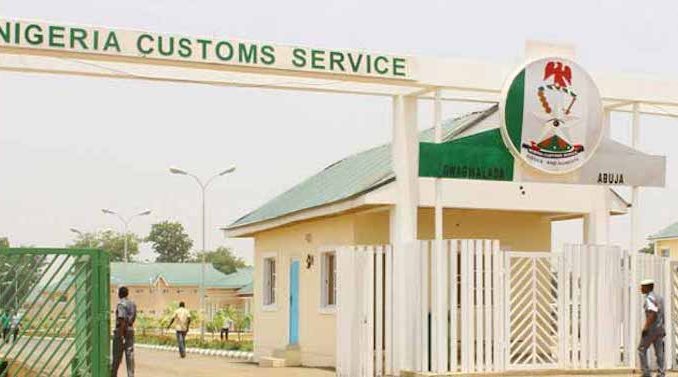
Following pushback from stakeholders, the Nigeria Customs Service (NCS) on Tuesday announced the suspension of the implementation of four percent Free-on-Board (FOB) value on imports as provided in Section 18(1)(a) of the Nigeria Customs Service (NCSA) 2023.
The suspension followed ongoing consultations with the Minister of Finance and Coordinating Minister of the Economy, Wale Edun and other stakeholders.
However, prior to the decision to suspend implementation of the levy, the Manufacturers Association of Nigeria (MAN) earlier yesterday had called on the federal government to direct the NCS to stop its implementation. MAN also made it known that its members were actively considering divesting or relocating their businesses to more conducive neighboring countries due to incessant levies and the worsening business environment in Nigeria.
Also on Tuesday, the Nigeria Employers Consultative Association (NECA) expressed fresh concern over the destructive impact of multiple fees imposed on businesses by government revenue agencies.
The decision by the NCS to the proposed fee was conveyed in a statement issued by the Assistant Comptroller of Customs, National Public Relations Officer (PRO), Abdullahi Maiwada.
He said the suspension period would allow the service to further engage with stakeholders while ensuring proper alignment with the Act’s provisions for sustainable funding of these modernisation initiatives.
He said this would also enable comprehensive stakeholder engagement and consultations on the NCSA implementation framework, adding that the timing of the suspension aligned with the exit of the contract agreement with the service providers, including Webb Fontaine, which were previously funded through the one per cent Comprehensive Import Supervision Scheme (CISS).
This, he said, presented an opportunity to review customs revenue framework holistically.
Under the previous funding arrangement repealed by the NCSA 2023, separating the one per cent CISS and seven per cent cost of collection created operational inefficiencies and funding gaps in customs modernisation efforts, the statement said.
Maiwada however, said, “The new Act addresses these challenges by consolidating ‘not less than four per cent of the FOB value of imports’, designed to ensure sustainable funding for critical customs operations and modernisation initiatives.
“This transition period will allow the service to optimise the management of these frameworks to serve our stakeholders and the nation’s interests better.
“The Act further empowers the service to modernise its operations through various technological innovations. Specifically, Section 28 of the NCSA 2023 authorises developing and maintaining electronic systems for information exchange between the Service, Other Government Agencies, and traders.”
He said the service was already implementing several digital solutions, including the recently deployed B’Odogwu clearance system, which stakeholders are benefiting from through faster clearance times and improved transparency.
Other innovative solutions authorised by the Act included the Single Window implementation (Section 33), Risk management systems (Section 32), Non-intrusive inspection equipment (Section 59) and Electronic data exchange facilities (Section 33(3)).
Nonetheless, the service reaffirmed its commitment to implementing the provisions of the Act in a manner that best serves its stakeholders while fulfilling its revenue generation and trade facilitation mandate.
He said the service would communicate the revised implementation timeline following the conclusion of stakeholder consultations.
The Director General of MAN, Mr. Segun Ajayi-Kadir, who made the call, said suspending the FOB levy was the way to go and implored the, “federal government to urgently direct the NCS to halt the implementation of the four percent FOB levy.
“We equally urge Mr. President to direct the NCS to engage with relevant stakeholders and the Presidential Committee on Fiscal Policy and Tax Reform in order to align with the ongoing landmark and wholesale reform agenda of government.
“We believe that this consultative approach will engender the mainstreaming of the input of relevant economic actors; repurpose the revenue aspiration of the service and reassure the business community of the commitment of the Tinubu’s administration to the advancement of the domestic economy.
The director general of MAN said results of MAN’s quarterly manufacturers CEO Confidence Index have continued to show less optimism about the outlook of the sector.
“We admonish that many of our members are actively considering divesting or relocating their businesses to more conducive neighboring countries. All these are the result of the consistent and persistent cost escalation trajectory that we have witnessed in more recent times.
“There is, therefore, wisdom in halting the drift and intentionally averting what promises to be an unenviable de-industrialisation episode in our history,” he added.
He stated that it cannot be the intention of the government to decapitate the productive sector, especially when President Bola Tinubu had rightly and consistently promised to promote domestic production, incentivise export and quite importantly, create a $1trillion economy by 2030.
MAN further said its aversion to the introduction of the levy was further predicated on the fact that the already high rate of calculating the customs duty exchange rate and the new levy, “will further escalate the cost of imported raw materials, which had earlier jumped by over 118 percent from N2.07 trillion in the first nine months of 2023 to N4.53 trillion in the same period of 2024.”
It added that the levy would cause heavy disruption in the supply chain, trigger raw materials stock-out in many manufacturing concerns, inflict higher cost of demurrage, further increase the huge volume of unsold inventories and worsen the competitiveness of Nigerian manufacturers.
“The levy is coming at a time when the headline inflation has hit a historic record of 34.8 percent in nearly three decades and the majority of Nigerians are struggling.
“Therefore, the impact on the cost of locally produced items will be instant and far-reaching.
“The introduction of the levy contradicts the principles of the ongoing Fiscal Policy and Tax Reforms and the spirit behind the tax bills currently being considered by the National Assembly.
“These efforts are targeted at eliminating multiplicity of taxes and reduction of tax burden for households, manufacturers and other private businesses,” the association said.
It further argued that in addition to the existing one percent CISS’ fee, extant duties, and other cargo clearance charges, the new customs operations levy would increase import transaction costs, compounding the already high cost of doing business significantly.
“The introduction of the levy is an additional incentive to smuggling, trade diversion, under declaration of duty and other trade infractions that has bedeviled our country, stretched the capacity of our customs service and undermined the revenue profile of the country,” it said.
MAN, therefore, said that it was constrained to express concern over the sudden and inopportune introduction and implementation of the four percent FOB levy by NCS.
“The association views this development as an unfortunate addition to the one percent CISS fee being paid by its members at a time that all Government agencies should be seeking ways to deescalate cost of doing business in Nigeria, as it is being done in other economies,” it said.
Similarly, NECA has expressed concern over the destructive impact of multiple fees and charges imposed on businesses by government revenue agencies.
The association also said that it was worried about the tendency of the government to often disregard International Labour Organisation’s (ILO) conventions duly endorsed by the country.
NECA said it would try to push the issue of sustainable enterprises and the enactment of a revised Labour law as part of the agenda of the meeting with the Director General of the ILO Gilbert F. Houngbo who was expected in the country today.
Speaking at a Press Conference in Abuja yesterday, the Director General of NECA, Adewale Smatt-Oyerinde said owners of businesses in the country were increasingly coming under the weight of all forms of taxes.
He said the charges being imposed on the businesses to shore up government revenue have negative impact on the growth and survival of private sector entities.
Smatt-Oyerinde said as an employers’ body, NECA has taken up the matter with the government to see how the charges could be harmonised but that it appears the revenue agencies were engaging in competition for higher revenue collection.
He said the present competition for higher revenue generation by the agencies was driving sustainable enterprises into precipice.
He added: “Sustainable enterprises is also a very key issue we need to present to ILO. Businesses need to survive and how agencies like the Nigeria Ports Authority and other agencies use to impose charges and taxes does not encourage private sector business growth.
“Everybody is just piling up the charges that the private sector will pay and at the same time, we expect them to create jobs and want the private sector to be responsible in its activities. It doesn’t work like that.
“For us, for every revenue these agencies make, we should begin to interrogate to find out how many jobs were lost for you to earn that N10 billion revenue recorded by the agency, how many businesses were shut down because of the N1 trillion revenue you have to make for government,” he added.
On what will form the agenda for the meeting with the DG of ILO, during his visit Oyerinde said NECA would like him to remind the federal government about the importance of the passage of the new Labour Act which has been in the works for some time now.
The NECA DG the protection of labour and employers’ rights was one of the issues that would be put on the table when the ILO Director General visits the country.
According to him, NECA feels concerned about such threats by the government to proscribe Labour unions, ” because it may one day be extended to the employers’ federations.
Country Director of ILO, Vanessa Phala said the visit of the new DG of ILO to Nigeria which would be his first since the assumption of office would be very significant due to the leading role the country has been playing in the work of the organisation.


